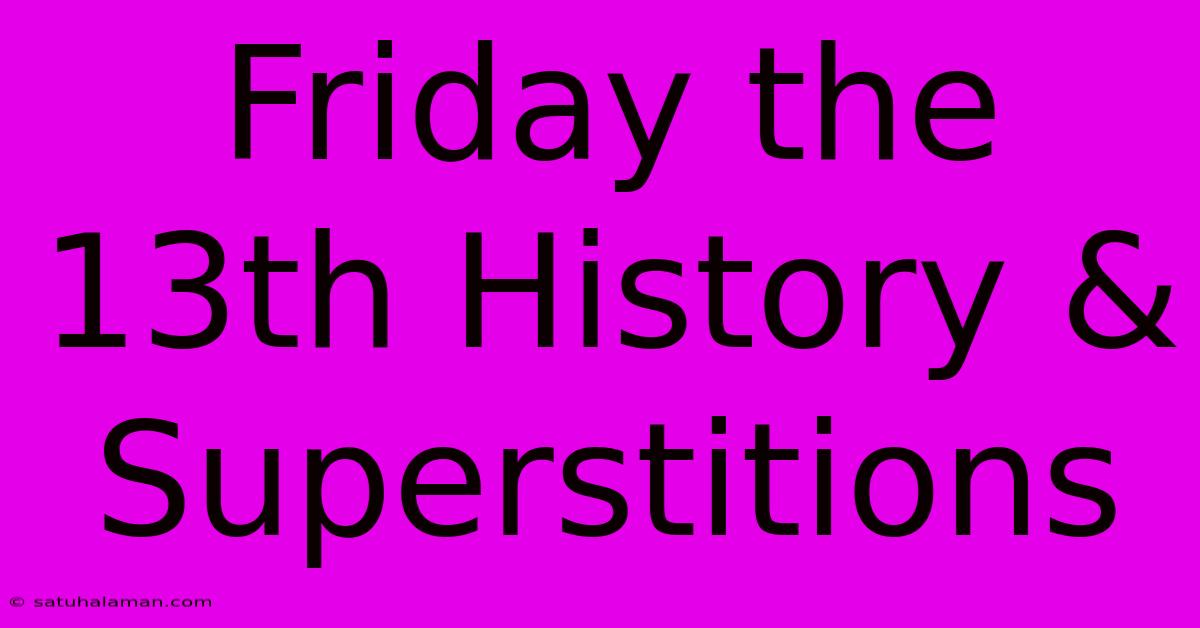Friday The 13th History & Superstitions

Discover more detailed and exciting information on our website. Click the link below to start your adventure: Visit Best Website satuhalaman.com. Don't miss out!
Table of Contents
Friday the 13th: History & Superstitions – Unraveling the Myths and Fears
Friday the 13th. The very phrase conjures images of black cats, broken mirrors, and looming misfortune. But where did this pervasive superstition originate, and why does it continue to hold such a powerful grip on our collective imagination? Let's delve into the history and superstitions surrounding this infamous day.
The Roots of Triskaidekaphobia and Paraskevidekatriaphobia
Before we explore the modern interpretations, it's crucial to understand the terms. Triskaidekaphobia refers to the fear of the number 13, while paraskevidekatriaphobia is the specific fear of Friday the 13th. These phobias aren't new; anxieties surrounding the number 13 and Friday have existed for centuries, intertwining with various cultural beliefs and historical events.
Biblical and Historical Connotations:
Some trace the origins of the number 13's negative connotation to the Last Supper, where 13 people were present before the betrayal and crucifixion of Jesus. This association, combined with the crucifixion occurring on a Friday, cemented the day's ominous reputation in Christian culture. However, the fear of Friday the 13th predates Christianity.
-
Norse Mythology: In Norse mythology, twelve gods were invited to a feast by the mischievous god Loki. Loki, the thirteenth guest, caused the death of Balder, the beloved god of light. This event cemented the number 13 as unlucky in Norse culture.
-
Medieval Superstitions: The number 13's association with bad luck permeated medieval society. Its negative image was further reinforced through various tales and superstitions. The number was often associated with witches' covens, reinforcing its ominous reputation.
The Spread of the Superstition:
The association of Friday with misfortune also has historical roots. In many cultures, Friday has long been associated with ill omens and negative events. This is likely due to a variety of historical factors, from religious beliefs to significant historical occurrences on Fridays.
The convergence of Friday and the number 13 created a potent combination, amplifying existing fears and superstitions. The fear wasn't uniformly spread, however. Some cultures consider Friday a lucky day, highlighting the cultural variations in superstition.
Modern Manifestations and Cultural Impact:
Today, the fear of Friday the 13th is widespread, even among those who don't fully believe in its significance. This widespread fear has measurable impacts:
-
Economic Impact: Businesses often report reduced sales and productivity on Friday the 13th. Travel plans are often altered, leading to decreased airline bookings and hotel occupancy. This showcases the significant influence of this superstition on everyday life.
-
Psychological Impact: For those with paraskevidekatriaphobia, Friday the 13th can cause significant anxiety and distress. This anxiety can range from mild unease to severe panic attacks. The constant dread leading up to this day can significantly impact mental well-being.
-
Pop Culture Influence: Friday the 13th has become a staple in popular culture, inspiring countless movies, books, and television shows. The slasher film franchise "Friday the 13th," in particular, has cemented the day's association with horror and suspense. This cultural presence reinforces the day's negative connotations.
Debunking the Myths and Embracing Rationality:
While the superstition of Friday the 13th is deeply ingrained in our culture, it's crucial to remember that it's precisely that – a superstition. There's no scientific evidence to support the claim that this particular day is inherently more dangerous or unlucky than any other.
Statistically speaking, Friday the 13th is no more likely to experience a higher incidence of accidents or negative events than any other day. This emphasizes the power of suggestion and the impact of collective belief on perception.
Overcoming the fear: If you find yourself affected by paraskevidekatriaphobia, there are ways to manage and mitigate your anxiety. Cognitive Behavioral Therapy (CBT) can help to identify and challenge the irrational thoughts and beliefs that fuel this fear. Mindfulness techniques and relaxation exercises can also be helpful in reducing anxiety levels.
Practical Tips for Navigating Friday the 13th:
For those who experience mild anxiety or simply find the superstition amusing, here are a few tips to navigate the day:
- Acknowledge the superstition: Recognizing the existence of this superstition can help to diffuse its power.
- Focus on positive aspects: Actively look for positive events and experiences throughout the day.
- Plan and prepare: Having a structured plan for your day can provide a sense of control and reduce anxiety.
- Practice self-care: Prioritize activities that promote relaxation and well-being.
- Humor and perspective: Approaching Friday the 13th with a sense of humor can help to minimize its impact.
Conclusion:
The history of Friday the 13th is a fascinating blend of cultural beliefs, historical events, and psychological phenomena. While the superstition continues to influence our modern world, understanding its origins and the impact of collective beliefs can help us navigate this day with greater awareness and less anxiety. Ultimately, the power of Friday the 13th rests not in any inherent misfortune, but in our perception of it. By choosing to embrace rationality and self-care, we can lessen the fear and focus on the day's potential for positivity. Remember, it's just another Friday.

Thank you for visiting our website wich cover about Friday The 13th History & Superstitions. We hope the information provided has been useful to you. Feel free to contact us if you have any questions or need further assistance. See you next time and dont miss to bookmark.
Also read the following articles
| Article Title | Date |
|---|---|
| Bail For Allu Arjun After Fan Dies | Dec 22, 2024 |
| Friday The 13th Myth History And Facts | Dec 22, 2024 |
| Allu Arjuns Arrest Pushpa 2 Fan Death | Dec 22, 2024 |
| Port Dover Friday 13th Winter Event | Dec 22, 2024 |
| Understanding Friday The 13th Superstitions | Dec 22, 2024 |
